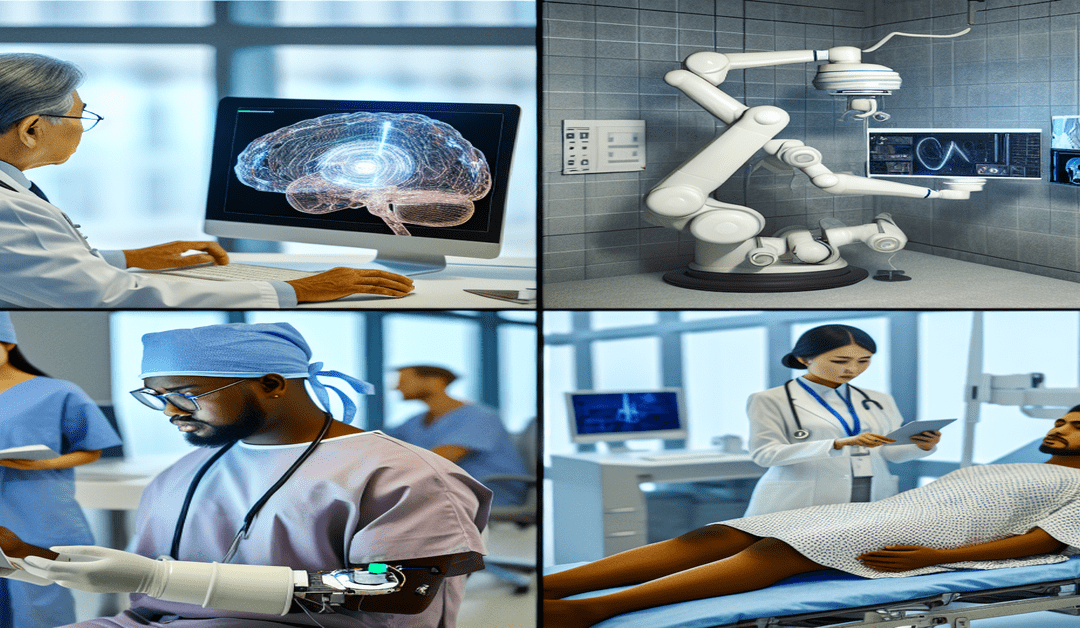Revolutionizing Healthcare: 10 Transformative Benefits of AI
In recent years, artificial intelligence (AI) has emerged as a game-changer in various industries, and healthcare is no exception. The integration of AI in healthcare has the potential to revolutionize the way we approach patient care, disease management, and overall healthcare delivery. From early disease detection to personalized treatment plans, AI is poised to transform the healthcare landscape, offering numerous benefits to patients, healthcare professionals, and healthcare systems alike.
Early Disease Detection: Saving Lives Through Timely Intervention
One of the most significant advantages of AI in healthcare is its ability to analyze vast amounts of medical data, enabling early detection of diseases such as cancer and heart conditions. By leveraging machine learning algorithms and deep learning techniques, AI can identify subtle patterns and anomalies in patient data that may go unnoticed by human eyes. This early detection can significantly improve patient prognosis and outcomes, as timely intervention is crucial in many life-threatening diseases[4].
Enhanced Diagnostic Accuracy: Empowering Healthcare Professionals
AI algorithms, particularly deep learning models, have demonstrated superior performance in analyzing medical images such as X-rays, CT scans, and MRIs. These advanced algorithms can detect minute abnormalities and provide more accurate diagnoses compared to traditional methods[2][4]. By assisting healthcare professionals in making informed decisions, AI enhances diagnostic accuracy and enables timely interventions, ultimately improving patient care.
Personalized Treatment Plans: Tailoring Care to Individual Needs
One of the most exciting applications of AI in healthcare is the development of personalized treatment plans. By considering a patient’s genetic profile, clinical history, and lifestyle factors, AI algorithms can generate customized treatment strategies that are tailored to the individual’s unique needs[1][3]. This personalized approach not only enhances treatment effectiveness but also improves patient satisfaction and adherence to treatment plans.
Predictive Analytics: Anticipating Health Risks and Optimizing Resource Allocation
AI-powered predictive analytics has the potential to revolutionize healthcare management. By analyzing vast amounts of patient data, AI can predict patient outcomes, identify high-risk individuals, and forecast disease trends[2][3]. This proactive approach enables healthcare systems to allocate resources more effectively, prioritize preventive measures, and ensure timely interventions for patients at risk.
Improved Administrative Efficiency: Streamlining Healthcare Operations
Beyond clinical applications, AI also plays a crucial role in optimizing administrative processes within healthcare organizations. From automating billing and claims processing to streamlining appointment scheduling and patient flow management, AI can significantly reduce the administrative burden on healthcare professionals[1][3]. By automating repetitive tasks and improving operational efficiency, AI allows healthcare staff to focus on delivering high-quality patient care.
Cost Savings: Reducing Healthcare Expenses
The implementation of AI in healthcare has the potential to generate significant cost savings. By enabling early disease detection and personalized treatment plans, AI can reduce the need for extensive and costly treatments, as well as minimize post-treatment complications[2]. Additionally, AI-driven predictive maintenance of medical equipment can optimize resource utilization and prevent costly downtime.
Patient Empowerment: Engaging Individuals in Their Health Journey
AI-powered devices and mobile applications are empowering patients to take a more active role in managing their health. These tools enable individuals to monitor their vital signs, track their medication adherence, and receive personalized health recommendations[2][5]. By providing patients with access to their health data and educational resources, AI fosters a sense of ownership and engagement in their healthcare journey.
Reduced Staff Burnout: Supporting the Well-being of Healthcare Professionals
Healthcare professionals often face high levels of stress and burnout due to demanding workloads and complex patient cases. AI can help alleviate this burden by streamlining clinical workflows, automating repetitive tasks, and providing decision support[5]. By reducing the administrative and cognitive load on healthcare staff, AI contributes to improved work-life balance and overall well-being.
Enhanced Accuracy in Surgery: Minimizing Risks and Improving Outcomes
AI-assisted robotic systems are revolutionizing surgical procedures by enhancing precision and minimizing the risk of human error. These advanced systems provide surgeons with real-time guidance, 3D visualization, and haptic feedback, enabling them to perform complex procedures with greater accuracy[1]. AI-powered surgical robots can also analyze vast amounts of surgical data to identify best practices and optimize surgical techniques.
Streamlined Operational Processes: Enhancing Patient Experience
AI has the potential to transform healthcare operations by optimizing hospital workflows, reducing wait times, and improving patient throughput. By analyzing patient flow data and predicting demand, AI algorithms can help healthcare organizations allocate resources more efficiently, minimize bottlenecks, and enhance the overall patient experience[3][5]. This optimization leads to reduced wait times, improved patient satisfaction, and better utilization of healthcare facilities.
The integration of AI in healthcare is not without challenges, such as data privacy concerns, regulatory hurdles, and the need for robust validation and testing. However, the potential benefits of AI in revolutionizing healthcare delivery are immense. As we embrace this transformative technology, it is crucial to ensure that AI is developed and deployed in an ethical, transparent, and patient-centric manner.
The future of healthcare is intertwined with the advancement of AI. By harnessing the power of AI, we can unlock new frontiers in disease prevention, diagnosis, treatment, and patient care. It is an exciting time for healthcare professionals, researchers, and innovators to collaborate and explore the boundless possibilities that AI offers in improving the lives of patients worldwide.
#ArtificialIntelligence #HealthcareInnovation #PatientCare
-> Original article and inspiration provided by TechTarget @stephen_bigelow
-> Connect with one of our AI Strategists today at ReviewAgent.ai

